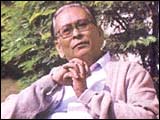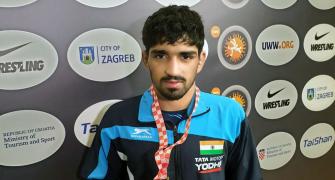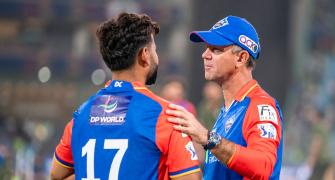He had a doctorate in physics and taught at Assam's Guwahati University for a number of years. But Dr  was better known as an accomplished short story writer, novelist, filmmaker, playwright and outstanding editor than as a teacher of physics.
was better known as an accomplished short story writer, novelist, filmmaker, playwright and outstanding editor than as a teacher of physics.
Dr Saikia, who died in Guwahati on August 13 at the age of 71 after a prolonged illness, found his true calling in literature and cinema. Survived by his wife, Priti, and daughters Sangita and Rashmi, Saikia dominated the literary and cultural field in Assam for over three decades.
He is also credited with having broken new ground in the field of journalism in the state while serving as editor of the children's magazine, Sofura. He was also chief editor of the prestigious fortnightly magazine, Prantik.
Considered an icon, Dr Saikia, along with a few younger directors like Jahnu Baruah and Gautam Bora, was instrumental in putting Assamese cinema on the global map.
His association with movies began when his first film, Sandhyaraag, released on August 5, 1973. Dr Saikia once acknowledged, 'Sandhyaraag translated a long cherished dream to reality for me.'
Sandhyaraag was the first Assamese film to be included in the Indian Panorama section of the International Film Festival of India. There was no looking back since and the maestro's works almost monopolised Assam's filmdom as far as inclusion in the Indian Panorama was concerned. Except Anirbaan (1981), all his other films were selected for screening in IFFI's Indian Panorama section.
![]()
More on Rediff!
![]()
![]()
![]()
![]()
Karisma's bridal avatars![]()
The ugly side of Bombay![]()
Tough guy Fardeen, plain Jane Preity!![]()
Reader review: Mumbai Se Aaya: utterly avoidable![]()
![]()
![]()
After Sandhyaraag, the filmmaker delivered eight outstanding and thought-provoking films and proved it was possible to make good films even without a conducive environment or proper infrastructure.
All his films bagged the prestigious Rajat Kamal Award for Best Regional Film: Sandhyaraag, Anirbaan (1981), Agnishnan (1985), Kolahal (1988), Sarothi (1992), Abartan (1994) and Itihaas (1996).
Dr Saikia also won the National Award for Best Screenplay for Agnishnan. His films have been screened at international film festivals held at Karlovy Vary (Czech Republic), Nantis (France), Valladolid (Spain), Algiers (Algeria), Pyong Yang (North Korea), Sydney (Australia), Munich (Germany), Montreal and Toronto (Canada).
Many of his stories have been translated into English, Bengali, Hindi, Telugu, Malayalam, Marathi and Gujarati. He has also scripted a large number of plays for All India Radio; some of them like Kolahal, Durbiksha and Itihaas were aired nationally.
He wrote many plays for Assam's mobile or roving theatre. He also wrote a number of one-act plays. All through his writings, films and plays, Saikia sought to potray the common man's hopes, dream, values, morals and struggle.
His most lasting contribution was the centre for cultural excellence that has come up on the outskirts of Guwahati. Called the Srimanta Sankardeva Kalaskshetra, this huge complex has come to symbolise Dr Saikia's vision to preserve Assamese culture and tradtion.
A must-see for every visitor to Guwahati, the SSA is now a venue for every prestigious cultural happening in the northeast.
His other dream, to have an exclusive complex for children, remains unfulfilled.
Click here for More Nostalgia







